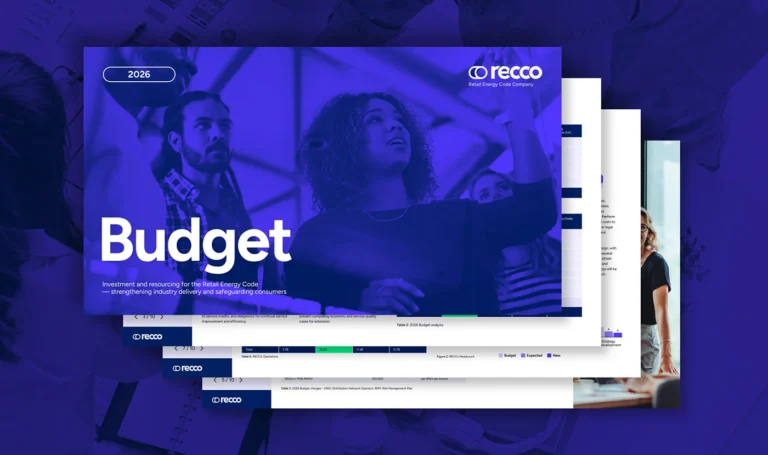Insights from our speakers
To help participants navigate the changes ahead, we brought together industry experts who each covered a key element of the MHHS transition. Through a series of insightful presentations and discussions, our speakers provided valuable guidance on REC impacts, code drafting, performance assurance and qualification, change management, and operational readiness.
Missed the session? Watch the REC MHHS Engagement Day 2025 Playlist on our YouTube channel to gain valuable insights into the changes ahead and how to prepare.
- Welcome from Sid Cox – CEO, RECCo – watch clip
- Introduction from Jenny Boothe – Head of MHHS, Ofgem – watch clip
- REC Impacts from Jon Hawkins & Jonny Moore, RECCo – watch clip
- REC Impacts Q&A Discussion – watch clip
- REC Code Drafting from Andrew Wallace, RECCo – watch clip
- REC Performance Assurance & MHHS Qualification from Daniel Rodgers, REC Code Manager – watch clip
- Change Management from Harriet Truss, REC Code Manager – watch clip
- REC Operational Readiness from April Harbour & Beth Brown, REC Code Manager, and Andrew Wallace, RECCo – watch clip
Your questions answered
During the session, we hosted dedicated Q&A sessions to ensure that all key topics were covered and that participants had the opportunity to clarify any uncertainties. Here’s a summary of your most important questions and our answers, covering Design, MHHS Qualification, REC Performance Assurance, and REC Code Drafting.
Topic: REC Impacts
Q: Could the EES API Sandbox be made available to software vendors who aren’t market participants?
A: Access to the EES Sandbox is available to existing EES users only. This is due to the database being populated with production data. Any EES user will be able to provide software providers etc. with access through their API key as per the production environment.
Topic: REC Code Drafting
Q: What forum is discussing I0241?
A: Change Issues Group (CHIG), first Thursday of every month.
Q: There are lots of SDEP process types missing last time I looked in the REC Schedules. Are these to be updated via I0241?
A: The redlined changes to reflect approved REC CP R0121, which was in the MHHS Metering Operations Schedule, did not include the relevant SDEP names. These will be added into the MHHS baseline when available through the implementation of CP R0121 and, therefore, are not required within I0241.
Q: Is it easy to find change-marked versions of the REC schedules?
A: All updated REC Schedules are redlined, except the Metering Operations Schedule due to fundamental structural change and the Migration Schedule as it’s new. These can be found on the REC MHHS Release wiki page of the REC Portal and the MHHS Programme website.
Q: Re. change freeze, is this going to apply across all impacted codes?
A: Yes, the change freeze is applicable to all codes. It was formalised by the Programme Steering Group and has been in place since 6 December 2023.
Q: On Hold CRs did not go through Impact Assessment, so may have an impact at go live that is unknown. How are these being picked up and validated and urgency assessed?
A: There are currently no MHHS Programme On-hold CRs allocated to the REC. This may change if ownership of the SSC transfers from BSC to REC, and we will liaise with the Proposer to understand any urgent concerns.
Q: Post M8, will any DIP file changes/amends be managed cross-code via CCSG like DTN changes are?
A: Yes, the same cross-code process will apply, and this is already in place. DIP flow changes, similarly to DTN flow changes, are led by the relevant Code with ownership of that message. The DIP Manager will be looped in via CCSG and engaged in the change process.
Q: Will the DIP catalogue continue to be available via the Swagger hub, even though the catalogue is now in the REC Portal?
A: Yes, Swagger will continue to be maintained by the DIP Manager and is expected to align with the Energy Market Data Specification.
Topic: REC Performance Assurance
Q: When will the new PAB performance metrics be published so all parties can understand the scrutiny they will be under by REC?
A: R0202 sets out the expected updates to the Performance Assurance Report Catalogue (PARC) for Performance Assurance monitoring under the MHHS arrangements. This is currently with the DIP Manager to confirm they can provide the reports we have requested within the PARC. Once this change is approved and the test data available, we will develop the metrics and update the Retail Risk Register. The Early Life Support Model being developed by the MHHS Programme will also give Parties visibility of the proposed metrics.
Q: Are non-SIT parties going to have to make a readiness assertion before M10?
A: Yes, the readiness assertion is for all participants as it covers changes required under the REC which are outside the scope of MHHS Qualification, such as the changes to legacy role requirements and Supply Number Format, etc.
Q: When will the Director management assertion be required and in what format?
A: Within section 7.3.2 of the Qualification Approach and Plan v4, this is scheduled for July-August 2025. We will accept electronic sign off and delegation of authority in line with the Maintenance of Qualification practice. Further details will be communicated to Parties in the next few months.
Topic: Design
Q: Will the D0217 / D0260 be sent on New Connection?
A: For Metering Points created pre-M10, the existing DTN messages will be sent to the Supplier on Initial Registration, i.e. D0217 and not the D0260. MHHS Qualified Suppliers will also receive an IF002 so they can decide whether to migrate the metering points.
For Metering Points created post-M10, they will be created as MHHS Metering Points. Where the initial registration is progressed by an MHHS Qualified Supplier, only the IF002 will be issued and no DTN messages (D0217).
For Metering Points created post M10, they will be created as MHHS Metering Points. Where the initial registration is progressed by a Non MHHS Qualified Supplier, only the D0217 will be received. This is subject to a Programme PPIR to provide clarity on the New Connection process.
Q: Will Import/Export auto-appointment work for Data Services?
A: Yes, for Metering Points in the Advanced Segment. Smart Metering Assets can have separate Data Services, so these won’t be auto-aligned for Metering Points in the Smart Segment.
Q: Import/Export Associations: where we have separate meters for Import/Export, can the customer appoint separate MOAs?
A: The auto alignment of MOAs applies where an Import/Export Association has been established within SMRS, in accordance with the BSC. Where an Import Export Association has not been established (for example, if there is a separate/standalone export meter) then separate MOAs can be appointed.
Q: Is the MTC still being retained in ECOES?
A: The MTC will continue to be available for Non MHHS Metering Points but will cease to be present once a metering point is migrated to MHHS.
Q: Industry Standing Data vs Market Domain Data: when will MDD be switched off? Also, where a table appears in both MDD and ISD, will they contain identical data?
A: MDD will be frozen for 5 years from M10. Where a table appears in both MDD and ISD changes made to ISD tables will mean that the data sets will no longer align.
Q: If the SSC/TPR are continuing can the optional/mandatory elements for advanced meters be amended in the design?
A: A REC CP (R0243) has been raised to transfer the ownership of the SSC data item from the BSC to REC ownership. Should this CP be approved we plan to consider the optionality of the SSC through a future REC Issue.
Q: SSC 0244 is used for load shaping so it has a settlement use. How is this being maintained if the SSC is moved to REC governance?
A: All existing SSCs will be retained in the Meter Configuration Table maintained under the REC.
Q: Is the MHHS Flag in the EES being tested in SIT?
A: Yes, the MHHS Flag is a requirement being tested through SIT Migration.
Q: For reverse migration, we’ve assumed pre-MHHS data (measurement class, MTC, etc) is no longer in EES and must be inferred by the supplier for CoS. Is this correct?
A: Yes, that’s correct. Legacy information not part of the MHHS data set will not be displayed against an MHHS-migrated MPAN.
Q: Can it please be confirmed that the suggested replacement for SMETS Version is Meter Manufacturer?
A: No, these are set out as separate data items.
Q: What, if anything, is being done to identify complex and Shared SVA sites to stop them from migration pre M14?
A: This is being discussed through the MHHS Programme’s migration framework. The question of Complex MPANs is due to be addressed in the next consultation. Also, a workshop on the migration framework design, open to all participants, is scheduled for 4 March 2025.
Q: During migration and linked to reverse migration, will Ofgem insist that a customer is clearly told about consequences of switching to an unqualified supplier?
A: No, until M14 Reverse Migration can take effect. There is no requirement for Suppliers to communicate either reverse of forward migration to Customers. It is recognised that in the non-domestic market there is a potential for the migration to impact contracts, in which case a communication to the customer would be required. Ofgem is considering guidance around this point.
Q: To clarify, will SSC and PC being used for estimation still be visible in EES?
A: These items will be available for all traditional meter assets and for Smart and Advanced Metering Points if they have been populated by the Supplier.
Q: Does an MHHS-Qualified supplier have the choice to reverse migrate inherited MHHS MPANs if they don’t yet have relationships with qualified service providers?
A: No, once a supplier is MHHS Qualified and effective within ISD they cannot choose to Reverse Migrate. Following MHHS Qualification a Supplier will go through Service Activation, which includes agreement of a Migration Plan with the MHHS Programme and confirmation that they are able to appoint MHHS Qualified Supplier Agents before they are made effective in ISD.
Q: In relation to the Domestic Premises Indicator (DPI), we have two: MPAN Designation (based on Profile Class) and DPI (as set in the CSS). Please confirm whether the CSS DPI will be retained in ECOES?
A: The CSS DPI will be available via the EES for all MPANs, and the MPAN Designation will be removed.
Q: What will the reverse migration process look like for a customer? Will they know this is happening and how it may affect them?
A: There shouldn’t be any impact on the customer other than the normal switch between Suppliers.
Q: Can you explain the change from Individual meter reading to Cumulative meter reading, and the difference between both?
A: The Cumulative Register Reading is the sum of the individual Time of Use Register Readings. Currently, all NHH meters are settled using the active Time of Use register readings. Post-MHHS, Smart Meters will be settled using the Total Cumulative register reading, regardless of how many Time of Use registers are active for billing purposes. This means the Switch/CoS reading used between Suppliers, for smart meters, will always be the Total Cumulative register reading for MHHS Migrated Metering Points.
Q: Are there similar rejection codes for other flows if Legacy process flows have been used during MHHS Migration?
A: Yes, if legacy messages (e.g. D0312) are sent to SMRS during MHHS Migration, these will be rejected using a new rejection code.
Q: Is LLF ID and DUos Tariff ID mapping like for like? Will customers be subject to the same charges, or is there a risk that some may be a different band?
A: The DUoS Tariff ID and LLFC ID are used for similar purposes and can match. However, these are separate data items and can have different values depending on the mapping adopted by the DNO.
Q: Does the D0311 remain for domestic use only?
A: Yes, there is no change to the application as set out in the Registration Services Schedule.
Q: Will DTN flows be available to test in Sandbox?
A: New DTN flows are live in the DTN and can be used with test flags. This includes new scenario variants created to reflect the new market roles.
Q: Does the D0311 remain for domestic use only?
A: Yes, there is no change to the application as set out in the Registration Services Schedule.
Q: Will DTN flows be available to test in Sandbox?
A: New DTN flows are live in the DTN and can be used with test flags. This includes new scenario variants created to reflect the new market roles.
Q: If Supplier A uses TOU register 1 for billing and Supplier B uses total active import, which reading would be expected to be in the D0311? It’s unclear.
A: The D0311 requires the losing Supplier to provide the active Time of Use registers and the Total Cumulative register for the smart meter. In this case, the losing Supplier should provide the meter readings for both ToU Register 1 and the Total Cumulative Register. Both would have a TPR of 1 but would be distinguished by the Register ID.
Q: Will the decision to not maintain some legacy data, during MHHS migration phase, cause problems for Suppliers needing to reverse migrate supplies?
A: The reverse migration design takes into account that some required legacy data items won’t be populated for MHHS-migrated Metering Points. These items should be populated by a Supplier during the COS process. Where this hasn’t happened, they will revert to the last items held within SMRS.
Q: Where can we find the full list of MTD data items?
A: Meter Technical Details are shared via a number of Market Messages: IF005 for all Metering Assets; and additionally D0149 / D0150 for Traditional Metering Assets and D0268 for Advance Metering Asset. The data items included in these messages are set out in the MHHS Energy Market Data Specification to be implemented at M8.
Q: Please could you provide a useful links document for all associated MHHS direct or indirect artefacts?
A: The majority of documents and information relating to REC impacts can be found on the REC Portal in the MHHS Hub in the Knowledge Centre. Links to the approved code drafting can be found in the REC Release for MHHS Milestone 8 article. We will provide a one-off full list in the MHHS bulletin as a reminder next week.
Topic: Balancing & Settlement Code (BSC)
Q: What will the impact be on the BSC 2025/26 Audit?
A: Please email MHHSPAF@Elexon.co.uk to join the Working Group, where these subjects are discussed on a monthly basis. The 25/26 BSC Audit scope will be published in April following comment and approval by the BSC PAB. This will detail work papers in scope.
Topic: MHHS Qualification
Q: Will you be circulating a best practice Qualification Assessment Document (QAD) guide with examples to support Final QAD submissions?
A: The QAD includes guidance against each question to clarify the Code Bodies’ expectations. Additionally, the comments raised during the Initial QAD review will be specific to allow the Party to ensure their Final QAD included the required level of detail. Please also refer to the QAD Walkthrough Webinar for further guidance on the level of information required for different questions. Furthermore, each month at the Qualification Working Group, we will share key lessons learnt from QAD reviews that have already been completed. Qualification Assessment Document and MHHS Webinars & Open Days – MHHS Programme.
Q: What’s the plan for current parties who do not qualify?
A: Suppliers that do not qualify in MHHS will be subject to measures described within Qualification Approach & Plan (QA&P) Annex 4. In effect they will not be able to onboard new Metering Points. Ofgem is also considering incentives in relation to this. MOAs that are not MHHS Qualified cannot be appointed to Metering Points after M14.
Q: Are you confident that REC is resourced appropriately for the speed and pace the parties need to requalify for M14?
A: Yes, we have a flexible resource model in place with regular checkpoints so that we can learn from our experience and adjust/re-forecast as needed.
Q: The dates for submission of the QAD for Non-MVC state December but this should be September. Please can you confirm?
A: Thank you for flagging this. Please refer to the latest version of the Qualification Approach & Plan for the latest approved dates. The slides have been updated for circulation.
Q: Any insight into QAD REC changes needed post-BSC mod P476?
A: We are adding questions to the QAD to ask Parties to demonstrate the controls they will operate to ensure they meet the conditions of an exemption. The updated QAD has been issued for consultation on 12 February 2025 and will be taken through the governance process for approval after the consultation closes. Please note that the additional questions will only apply to Parties seeking an exemption.
Q: In what scenarios would requalification be required, if at all?
A: After MHHS Qualification, Parties will need to disclose changes they are making as per the existing Change and Incident Notification process under the REC. As guidance, in general you are required to disclose changes if they may impact your ability or other Market Participant’s ability to meet REC obligations. We will review these on a case-by-case basis to determine the extent of assurance activities required.
Q: Even if you can’t provide a guide to how to draft answers to the QAD, will you be able to provide feedback on what good/bad things you have seen in early QADs?
A: We, along with BSCCo, are taking guidance for Parties to the Qualification Working Group to highlight common observations from the QAD submissions. We will also update the QAD FAQ document published on the MHHS collaboration base where required.
Q: Given the complexities, will there be named resources to support QAD response?
A: Your OAMs will continue to support you with queries related to the REC. Additionally, we advise Parties to send queries specific to their organisation to the REC Service Desk, and the relevant Qualification team member will engage with you.
Q: When feedback is provided to QAD parties, will it be a continual dialogue?
A: Parties can choose to resubmit and go through multiple rounds of comments or request a bilateral meeting, if required. However, the team will try to ensure that the feedback is clear, so Parties understand the changes they need to make.
Thank you for joining us
We appreciate everyone who took the time to attend our MHHS training event and engage in the discussions. Your participation is key to ensuring a smooth transition to MHHS. We’ve covered the key changes, what they mean for you, and the steps you need to take to stay compliant. If you need a refresher or missed the event, you can:
- Access our REC MHHS Training Slides
- Watch our REC MHHS Engagement Day 2025 Playlist
We’re here to help
If you have any further questions or need additional support, please reach out to us at mhhs@retailenergycode.co.uk.
We look forward to supporting you as we move towards MHHS implementation. Stay tuned for more updates and future sessions!









